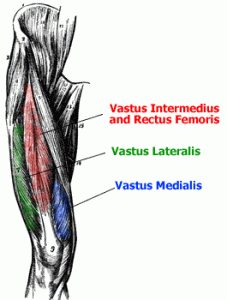Dave, why do I sometimes get a sharp pain in my knee when doing push ups?

Good question.
I’m sure a few people may have felt the same.
The pain my client was asking about was a sharp pain under the kneecap. A pain that can be intense, but often short lived.
So what could it be?
Well, usually a sharp pain under the kneecap is the fault of our rectus femoris muscle, or as we cool kids like to call it, the “rec fem”
What’s the rec fem?
It’s that big muscle that runs down the very front of your thigh.

Batmans massive Rec Fem is a major part of his badassness
Why does it hurt my knee?
Well, that’s not such a simple answer.
The rec fem is a biarticulate muscle, it crosses both the hip and knee joints.

Muscles that cross multiple joints generally don’t like being stretched at both ends at once, they like to shift tension from one end to the other.
So if the rec fem is long at the hip, ie the hip is extended, it may not be too impressed if you bend the knee a lot as that would mean it’s stretched at both ends.
It’s not impossible to achieve this, a fully healthy body should be able to go into hip extension and knee flexion without issue. But lets face it, if you’ve a few miles on the clock, can you really claim to be fully healthy?
I’m not.
I’ve way too much scar tissue and way too many damaged ligaments.
Doesn’t mean I can’t train hard and be awesome, I just have to be mindful of my limitations in order to get the most out of my training.
The next question then, is why does the rec fem kick off if stretched, or more accurately, stretch loaded.
Is it pulling tight to protect something? Is it pulling tighter than it ought to because something else isn’t doing it’s job?
What other players should be there to assist the rec fem in it’s job.
Well we know it has two jobs. Job A: Flex the hip or decelerate hip extension Job B: Extend the knee, or decelerate knee flexion Who else does job A? Well our “hip flexors” of course, the illiacus and the psoas muscles.
Now hands up if your hip flexors are tight.
Lets see……

As I thought, more than a few of you!
Who does job B?
The rest of the quadriceps muscles, ie the Vastus Lateralis, Medialis and Intermedius.
So hows your VMO (vastus medialis oblique)?

There are millions upon millions of essays, articles and blog posts on activating and strengthening the VMO. Almost as many as there are on opening up the hip flexors.
Oh, and here’s an interesting point, the nerve that innovates the rec fem, well that comes out of the spine at L4. And guess what the most common areas of back pain and injury happen to be?
You guessed it, the junctions between L4 and L5, and L5 and S1

Great image, I robbed it from www.spine-health.com
All told, it seems the rec fem is getting a pretty raw deal.
No wonder it hurts you!
So that’s all well and good, but what do we do about it?
Ah, now that’s a question.
Honestly, I can’t answer that in a blog post. Especially as your reasons are probably different to my reasons.
And without a proper assessment to determine the root of the problem, it would be irresponsible for me to offer any serious advice.
But check the mobility of your feet, do your foot bones move freely? Can your hip internally and externally rotate freely? Can your hip internally rotate as you load the leg and pronate (flatten) the foot? Can your hip externally rotate as you extend the knee and supinate (arch) the foot?
Can your pelvis tilt freely forward and back (anterior and posterior tilts)? What about hike and drop?
It’s not always as simple as “it hurts so do lunges and stretch” or get on the foam roller. As much as I wash it was.
So to finally answer Shay’s question, why did it hurt him in the push up? Well, was it while the knee was locked or did you suddenly unlock it? Were you in a posterior pelvic tilt, which I often coach people into for a push up? If so was the PPT putting length at one end, the flexion of the knee added a sudden length at the other end, maybe that caused the stab of pain?
We’ll find out in your next session mate, I’ve a few ideas for your particular case.
We’ll do a quick assessment.
Till then
Dave Hedges

